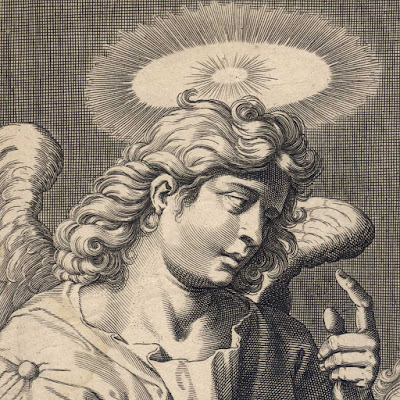Egbert
van Panderen (c1581–1637)
“St Matthew”, c1605 (1590–1637), after Pieter de Jode I (1570–1634), plate 1 from the series of four plates,
“The Evangelists”, published in Antwerp by Theodoor Galle (1571–1633).
See a copy of this
print with a few differences (e.g. St Matthew does not hold the quill in his
right hand and the design of the haloes of St Matthew and the angel are
different) by François van den Hoeye (1590–1636), after Egbert van Panderen (Hollstein
Dutch 1) at the Rijksmuseum: http://hdl.handle.net/10934/RM0001.COLLECT.123384.
Engraving on fine laid paper trimmed along the borderline and
lined with a support sheet.
Size: (sheet) 28.8 x 21.3 cm
Lettered on the plate in a cartouche below the image borderline: (left)
“Petr. de Iode figurauit. / Egbert. van Panderen / Sculpsit.”; (centre) "Diuo
Hominis facies MATTHAEO adstare videtur, /Qui Christum verè natum hominem esse
docet.” (Google transl. “MATTEO seems to be standing at the open air in the
face of a man, / He who teaches that Christ is truly born to be a man.”);
(right) “Theodorus / Galle / excudit. / 1.”
Hollstein IX.209.71 (F W H Hollstein 1949, “Dutch and Flemish Etchings,
Engravings and Woodcuts c.1450–1700”, Amsterdam)
The Rijksmuseum offers the following description of this print:
“The evangelist Matthew, writing at a table. Beside him, his
attribute is the angel. In a frame a two-line caption in Latin. First print
from a series of four with the evangelists.” (http://hdl.handle.net/10934/RM0001.collect.160347)
See also the description at the Metropolitan Museum of Art: https://www.metmuseum.org/art/collection/search/644101
Condition: crisp, well-inked and well-printed impression
(undoubtedly a lifetime impression) in near pristine, museum-quality condition (i.e.
there are no tears, holes, folds, abrasions, stains or foxing) trimmed along
the borderline and lined on a support sheet.
I am selling this strong engraving of the highest order of
technical accomplishment for AU$186 in total (currently US$142.93/EUR116.28/GBP101.89
at the time of posting this listing) including postage and handling to anywhere
in the world.
If you are interested in purchasing this impressive print
exemplifying the Mannerist spirit at the time of its execution, please contact
me (oz_jim@printsandprinciples.com) and I will send you a PayPal invoice to
make the payment easy.
This print has been sold
In an earlier post in
which I discuss Egbert van Panderen’s leaning to the exuberant energy of
Northern Mannerism (e.g. his fascination with strong contrasts of light and dark, dramatic
gestures, exaggeration of muscles and folds in drapery), I drew attention to
the artist’s technical virtuosity in his amazing use of the burin to render “clothes
as shimmery as satin” (see http://www.printsandprinciples.com/2016/09/egbert-van-panderens-engraving-after.html).
Again, Van Panderen’s disciplined command of the burin is hard to ignore in this
highly refined portrayal of the angel assisting St Matthew to write his gospel.
What I especially
like about this print, however, is that the artist has not only captured a
moment of spiritual engagement between the angel and the saint—as shown by their
hand gestures to each other—but that the special moment of connection between
the two figures is not one of an non-specific instant in time. Instead, what is
captured is an endless moment of on-going transcendent engagement. What I mean
by this comment is that Van Panderen has rendered the scene so that all the
portrayed features have the same degree of focal clarity—a visual democracy if I
may describe the consistency of focal resolution in this way. In this “visual
democracy” of sameness, the background does not vary in texture or tone and the
treatment of the figures also does not vary from foreground to background or
from side to side. In short, what Van Panderen is portraying
in this scene is a spiritual communion between the angel and the saint where
the signified meanings of the figures’ gestures are frozen forever.








No comments:
Post a Comment
Please let me know your thoughts, advice about inaccuracies (including typos) and additional information that you would like to add to any post.